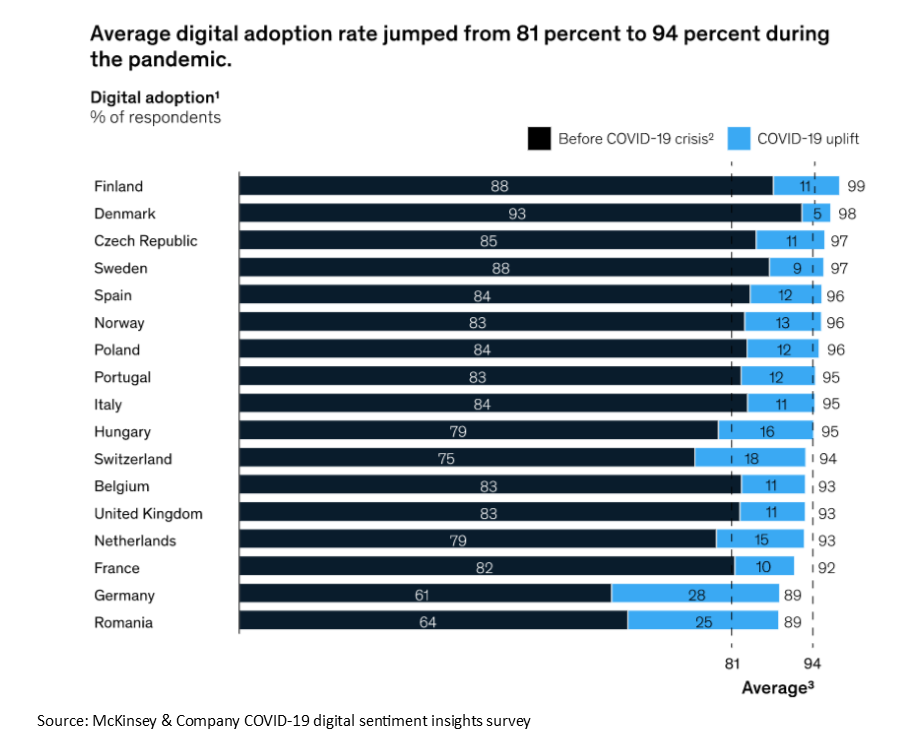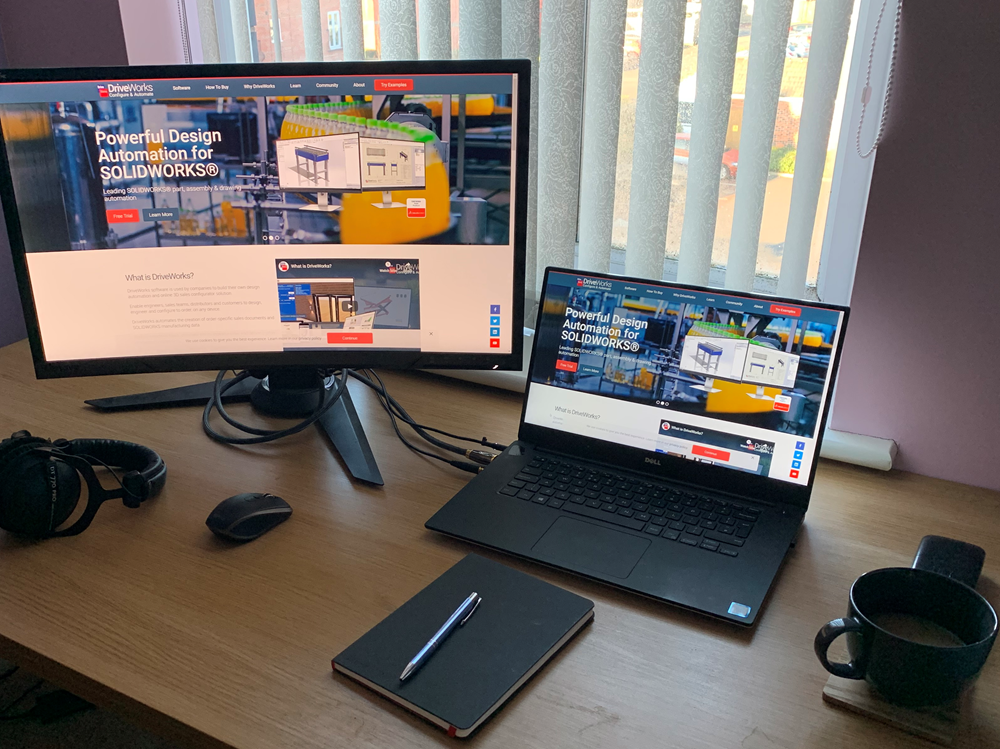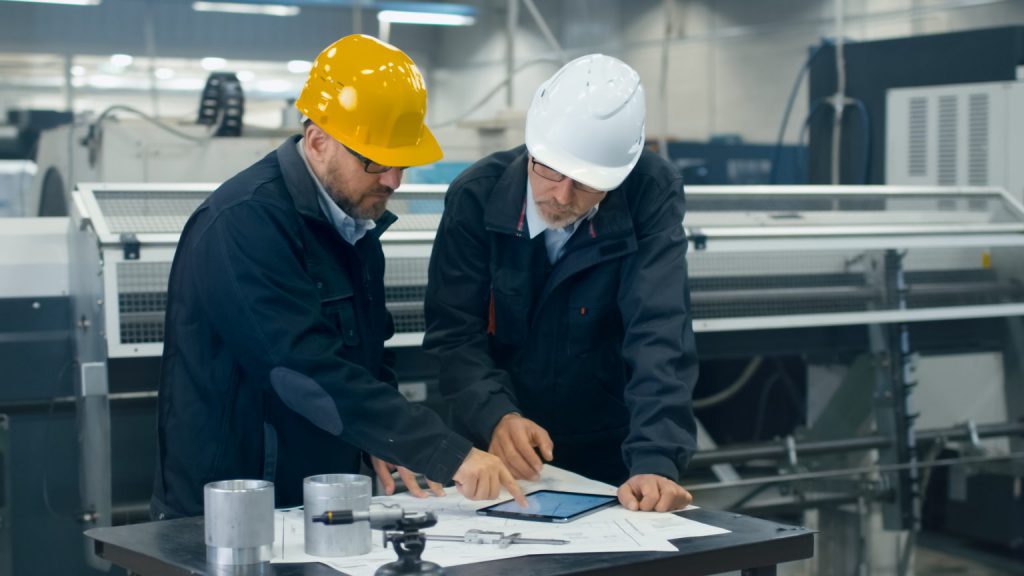Adapting to the Changes of Digital Transformation
Digital transformation is a hot topic throughout many industries.
There is a real buzz around the introduction of digitalisation and how it can help companies be agile, efficient and resilient.
All essential features when moving forward from the global pandemic.
As a result of COVID-19, we have seen a glimpse into a future world – where digital is a key part of every interaction.
Moving into this new era – we have seen that digital transformation is no longer just a nice to have for those in the manufacturing industry wanting to drive productivity and increase efficiency.
With the world changing at an unprecedented speed, we have seen tangible transformation taking place– with technology at its centre.
Responding to the Global Pandemic
Although it may not seem like it – digital transformation is nothing new.
Pre COVID-19 lots of companies were seeing the many benefits of going digital.
COVID-19 has dramatically sped up digital transformation, and not just in the manufacturing industry.
For those who were already embracing digital – we have seen that the pandemic has accelerated their digital journey and they are already reaping the benefits.
As we moved further into the pandemic, it seemed a gap was forming between those that had introduced and invested in digital and those that had not.
Businesses who had not embraced digital found themselves less prepared to adapt to the sudden changes the crisis brought and therefore exposed to greater weaknesses.
Companies are now responding to the pandemic and are seeing the importance of being able to pivot quickly, to control processes remotely and have the ability to adapt quickly to changing market conditions.
Businesses are looking for ways to move on from COVID-19 and come out of this stronger.
Digitalisation will be key to enabling industries to meet changing customers’ needs and adjust to changing markets as we move forward.

Adjusting to the New Way of Working
The global pandemic has changed the way we work.
Forcing customers, employees, and supply chains into digital channels and new ways of working.
As the UK and many other countries entered lockdown, our daily routine of commuting and working from the office was rapidly shifted and we found ourselves adjusting to working remotely.
Some companies were forced to put projects on hold and uncertainty for the future was on their minds.
However fast forward to now, it’s clear that for numerous organisations who had already begun to adopt digital techniques, working remotely has not only been achievable but actually a huge success.
Through the pandemic, we have learnt that remote workforces, automation, transparent flexible supply chains and data security are all key elements to digital transformation not just in manufacturing – but across all sectors.
We are seeing that organisations who embrace new ways of working are improving competitiveness and productivity through the better use of technology and digital skills.

Driving Agility
Whilst agility has always been a key driver of successful business operations, now more than ever we are seeing the importance of businesses being able to pivot and respond quickly to changing factors.
Markets and trends are constantly moving and evolving. It is important that businesses can adapt to these changes quickly and effectively, otherwise they are at risk of falling behind.
Coronavirus is the perfect example of how rapid these changes can happen. No one could have foreseen the damage it has done to the economy.
For some, the lack of agility and the ability to respond has sadly meant their business won’t recover from this hard time.
However, for others, the pandemic has been an opportunity to shine.
We have seen an incredible response from manufacturers, businesses and individuals who have acted quickly. Switching and upscaling production from their usual business to designing, producing and delivering the urgently needed equipment to meet the growing demand.
Moving forward, digitalisation will be key to enabling industries to meet changing customers’ needs as we move forward.
Businesses without a strong digital strategy are likely to struggle to be as agile as their competitors making them slow to adapt to rapid changes in the market.

Increasing Efficiency
We have seen that businesses who already had digital transformation plans in place accelerated their plans throughout the pandemic, while many with no digital transformation plans saw the need to develop some in order to keep up with others.
Through the implementation of new technologies, business processes are becoming more efficient.
The idea of digital transformation is to use technology not just to replicate an existing service in a digital format, but to use new technologies to transform that process into something significantly better.
Businesses implementing a digital-first approach to processes, operations, and customer engagement are achieving a more streamlined and efficient way of working.
Take automation, for example, a necessary step towards digital transformation.
Automated processes are a key driver of productivity – resulting in flexible, transparent, and stable supply chains.
Through automation, systems, workflows and processes can all be enhanced to become faster, more efficient and much more valuable to the organisation.
Sustainability in the Future
As companies begin to explore new technologies, they are looking for investments that not only allow the business to be flexible and agile right now but continue to be in the future.
Business are looking for solutions that will continue to grow and develop alongside the businesses needs and overall strategy as it evolves in the future.
The world will continue to change, and as we enter the ‘new normal’ it is important that businesses consider longer-term strategies and re-prioritise digital plans to reflect the evolving markets.

Changes are happening for the better
More and more businesses are looking for ways that can move on from COVID-19 and come out of this stronger.
Throughout the pandemic, people have relied more on technology than ever before, whether it being internet access, video calling, mobile phone apps or video streaming sites such as Netflix and Disney+.
Consumers are adjusting to this new tech-dependent world where technology and devices are establishing themselves in our daily lives.
As that happens, performance and user experience will become crucial to meeting consumers’ expectations and driving brand growth.
Digitalisation will be key to enabling industries to meet changing customers’ needs and expectations, allowing businesses to rapidly adjust to evolving markets as we move forward.
Those who don’t and continue to look at it as ‘business as usual’ will fall behind.
Embracing Digital Transformation with DriveWorks
Throughout the pandemic, we’ve been hearing from our customers who have been embracing change and thriving as a result.
Whether they’re changing their manufacturing to provide much-needed supplies, working on new product ideas, or using this time to improve and work on projects they don’t usually have time for, many of our customers are focusing on moving forward and working smarter.
Implementing an online configurator with DriveWorks can help you to stay ahead of the competition, reduce costs, and win more business.
Our product configurator examples are a great way to see what’s possible with DriveWorks.
Head to driveworkslive.com to learn how versatile and customizable DriveWorks is and get some inspiration for your own products.
Try DriveWorks Powerful Design Automation For Free
Take a look at how you can get started on your Digital Transformation journey with DriveWorks for free.
Activate DriveWorksXpress
Start automating with DriveWorksXpress free inside every seat of SOLIDWORKS.
Trial DriveWorks Solo
Try out DriveWorks Solo for free with the DriveWorks Solo 30 Day Free Trial.